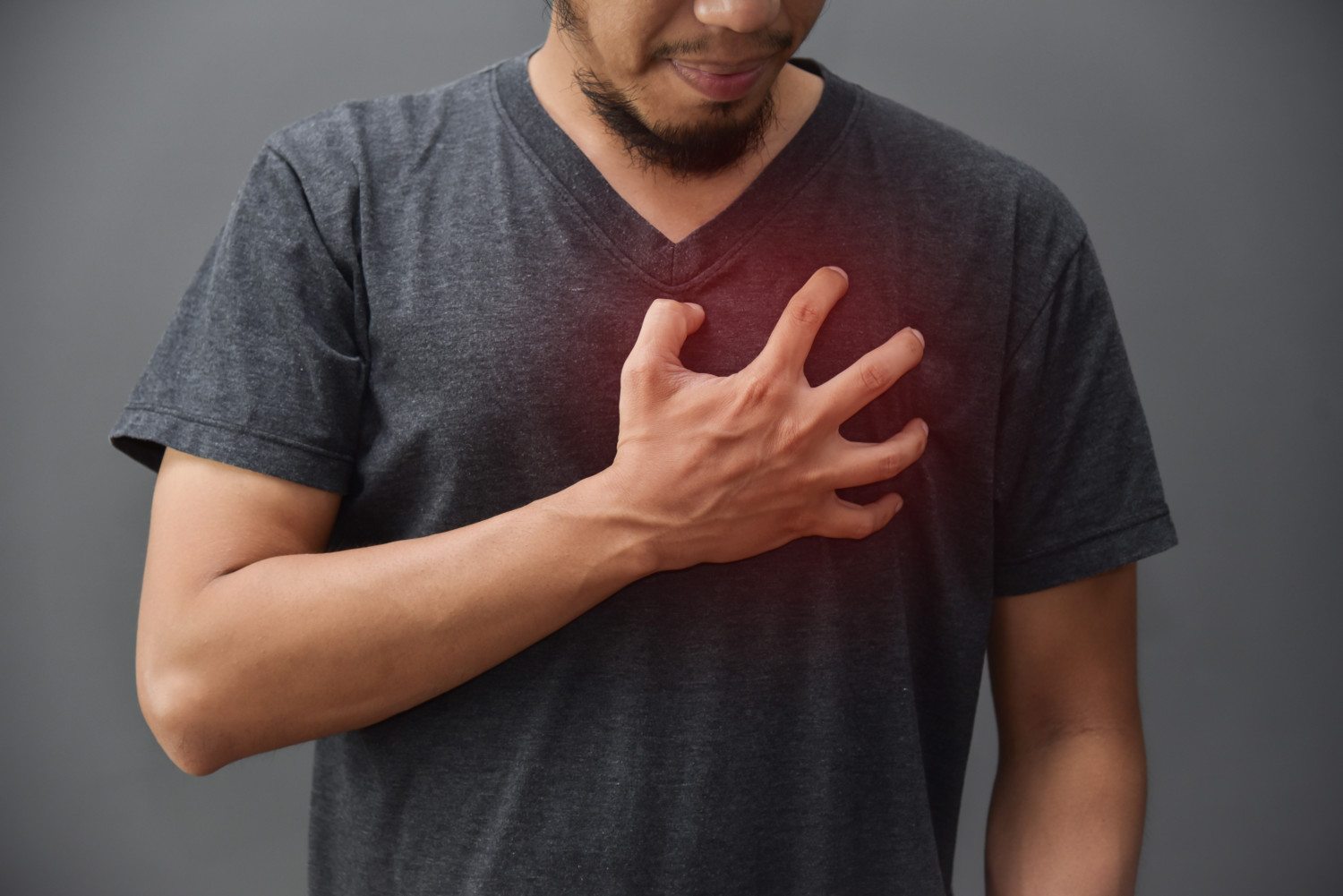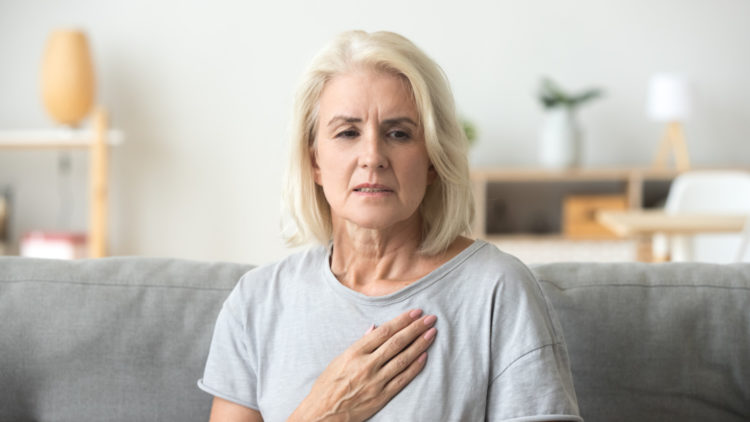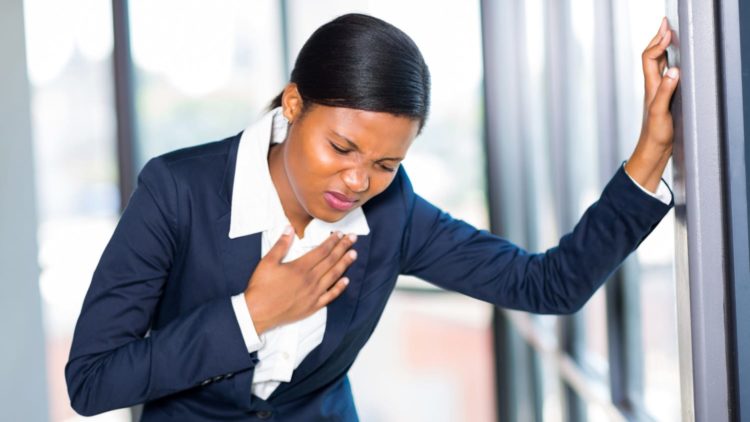What happens to your body when you have a heart attack

When we think of a heart attack, we usually think of that stereotypical scene in a movie where someone suddenly grabs their chest, gasps for air and falls to the floor. In reality, heart attacks don’t usually play out in that same dramatic way. Some of the signs of a heart attack are more subtle, and not all of them are fatal.
To ensure you’re protecting yourself if you or someone you love is having a heart attack, it’s important to understand the actual signs and symptoms. We spoke with several cardiologists to give you the lowdown on what actually happens to your body during a heart attack and what to do if you’re having one.
What Is A Heart Attack?
As most of us know, the heart is a muscular organ located in our chest that is responsible for pumping blood throughout the body. “A heart attack happens when one of the major arteries supplying the heart oxygen gets blocked,” explains cardiologist Dr. Luiza Petre. This impedes the delivery of vital nutrients and oxygen. When your cells no longer receive the energy they need, this causes a cascade of events, triggering the symptoms of a heart attack. The amount of damage to the heart muscle depends on the size of the area supplied by the blocked artery and the time between injury and treatment.
What Causes A Heart Attack?
“The most common cause is something called ‘coronary artery disease’ or ‘atherosclerosis,” says Petre. As we get older, the body deposits cholesterol fatty plaques onto the walls of our arteries. How much gets deposited is directly related to people’s lifestyle, smoking habits, diet, exercise, inflammation and weight. When the cholesterol plaque on the arteries’ walls becomes unstable or fragile, it breaks up and forms a clot, obstructing the arteries. What’s scary is that the arteries don’t have to be fully blocked to trigger symptoms; most heart attacks occur when these blockages are less than 50 percent. “Most of the heart attacks occur as silent bombs, when people didn’t even know they suffered from these plaque deposits to begin with,” says Petre.
There are also a number of other causes that can trigger a heart attack. Recreational drug use of substances like cocaine can cause the arteries to contract in a spasm to a closing point. Smoking can also trigger a heart attack.
“In unusual, rare situations, people can have small clots migrating from other locations and reaching the heart arteries,” says Petre. A heart attack can also occur due to the spasm of a coronary artery, which can occur at rest or even occur in people without significant coronary artery disease.
Symptoms To Look Out For
The start of a heart attack isn’t always obvious or dramatic. A heart attack can often begin with subtle symptoms, and with mild discomfort versus full-on pain. Symptoms vary from person to person, and they can range in intensity. You might have just a handful of symptoms, or many.
The most common symptom is chest pain (angina). “This can be described as a heaviness, tightness, pressure, aching, burning, numbness, fullness or squeezing feeling that lasts for more than a few minutes or goes away and comes back,” says cardiologist Dr. Amnon Beniaminovitz. “It is sometimes mistakenly thought to be indigestion or heartburn.”
Here are some other common symptoms to look out for:
- Pain in other areas of the body, including the arms, left shoulder, back, neck, jaw or stomach
- Difficulty breathing or shortness of breath
- Sweating or “cold sweat”
- Nausea or vomiting
- Light-headedness, dizziness, extreme weakness or anxiety
- Rapid or irregular heartbeats
It’s important to note that there are some differences in heart attack symptoms when it comes to women, as they often don’t experience the typical chest pain that men do. “Women are slightly more likely than men to report unusual symptoms,” says Beniaminovitz. Those who have more vague or less typical “heart” symptoms have reported the following:
- Upper back or shoulder pain
- Jaw pain or pain spreading to the jaw
- Pressure or pain in the center of the chest
- Light-headedness
- Pain that spreads to the arm
- Unusual fatigue for several days
What To Do If You Think You’re Having A Heart Attack
“If you are having any one of the symptoms described above that lasts for more than five minutes, seek emergency treatment (call 911) without delay,” says Beniaminovitz. “Early recognition and treatment of heart attack symptoms can reduce the risk of heart damage and allow treatment to be started immediately. Even if you’re not sure your symptoms are those of a heart attack, you should still be evaluated.” After calling 911, emergency personnel may tell you to chew one full (325 mg) aspirin slowly, as long as you don’t have a history of an aspirin allergy or bleeding. Beniaminovitz says that aspirin is especially effective if taken within 30 minutes after the start of your symptoms.
Cardiologists have a phrase they use often when it comes to acting fast: Time is muscle. “It refers to the fact that the faster we can open the blocked artery, the less damage will be done to the heart, and the greater are the chances for survival in full,” says cardiologist Dr. Regina Druz, MD, FACC.
Heart Attack Vs Cardiac Arrest
Cardiac arrest is slightly different than a heart attack. While a heart attack is due to blood flow blockage to the heart, a cardiac arrest occurs when the heart malfunctions and stops beating. “This is when quick and dramatic oxygen deprivation affects the electricity of the heart and makes it stop,” says Petre. “Life hangs on a thin thread.”
For cardiac arrest, an electrical shock or adequate life support within minutes is the only way to survive, and permanent damage can occur in a matter of minutes. Sudden cardiac arrest can occur after a heart attack or during recovery, as heart attacks increase the risk of cardiac arrest—although most heart attacks do not ultimately lead to cardiac arrest.
How To Prevent Heart Attacks
“Ask your doctor whether you are at risk for a heart attack and what you can do to reduce your risk factors,” says Beniaminovitz. “Be sure to ask about aspirin and nitroglycerin.” Living a heart-healthy lifestyle is important. This includes making dietary changes, quitting smoking, exercising regularly and keeping up with doctors appointments.
If you suspect you’re having a heart attack, better safe than sorry. Knowing the possible symptoms can help make the difference between life and death.





